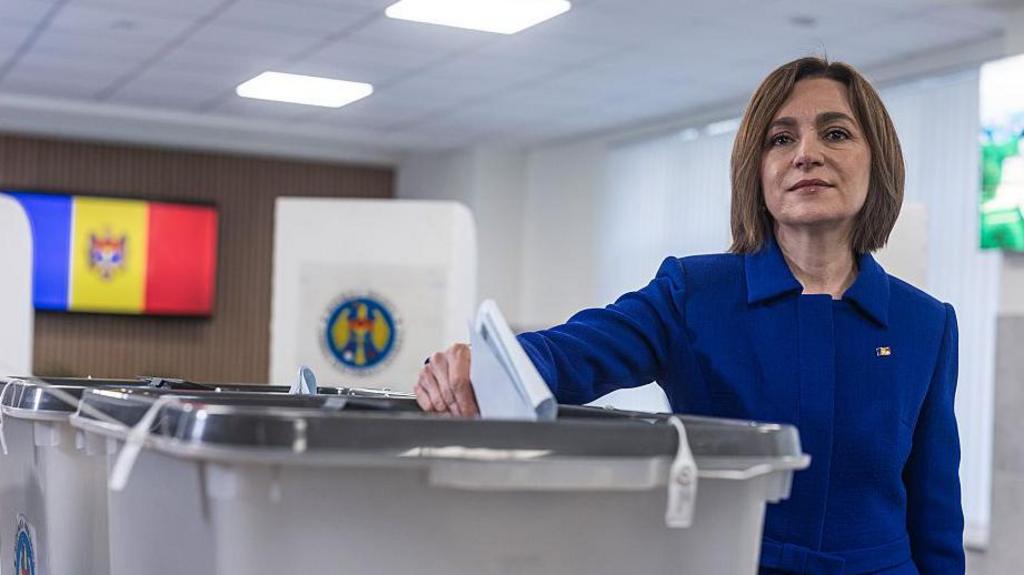Moldovan citizens have cast their ballots in parliamentary elections widely considered pivotal for the nation’s trajectory toward European Union integration. The vote has been shadowed by allegations of significant Russian interference.
Moldova’s security services initially raised concerns, which were subsequently echoed by President Maia Sandu, a staunch advocate for EU membership. Speaking to reporters outside a polling station in the capital, Chisinau, Sandu asserted that the future of her nation, strategically located between Ukraine and Romania, was at stake.
Initial results are anticipated in the coming hours. The electoral commission reported a voter turnout of just under 52% by the close of polls at 21:00 (18:00 GMT).
The political landscape features a closely contested race between Sandu’s Party of Action and Solidarity (PAS) and the pro-Russian Patriotic Electoral Bloc.
A significant factor is the participation of over 267,000 voters from the largely pro-Western diaspora. Reflecting the heightened tensions surrounding the election, bomb threats were reported at polling locations in Italy, Romania, Spain, and the United States.
Similar alerts were also registered within Moldova itself.
Moldova also contends with the pro-Russian breakaway region of Transnistria, situated along its border with Ukraine and hosting a Russian military presence. Residents of this territory, who hold Moldovan passports and largely support Moscow, must cross the Dniester River to participate in the election.
The Moldovan populace has faced hardship due to Russia’s full-scale invasion of neighboring Ukraine, compounded by soaring inflation and pervasive corruption.
President Sandu, 53, secured a second term in office last November, cautioning Moldovans that the fate of their democracy rested on their choices: “Don’t gamble with your vote, or you risk losing everything!”
Should PAS lose its majority in the 101-seat parliament, it would need to seek alliances with other parties expected to gain parliamentary representation, such as the Alternativa bloc or the populist Our Party.
Shortly after polls closed, Socialist leader Igor Dodon, a key rival of Sandu, appeared on national television to prematurely declare victory for his pro-Russian Patriotic Electoral Bloc, despite the absence of exit polls or preliminary results.
Dodon urged the PAS government to relinquish power and called on supporters to rally in the streets on Monday to “defend” their vote.
One of the parties within his bloc was recently barred from participating in the election due to allegations of illicit funding.
Leading up to the election, law enforcement officials reported evidence of an unprecedented Russian effort to disseminate disinformation and engage in vote-buying. Numerous individuals were apprehended, accused of traveling to Serbia for firearms training and orchestrating civil unrest. A BBC investigation exposed a network offering financial incentives for posting pro-Russian propaganda and fabricated news on social media.
Parties aligned with Moscow have dismissed the police claims as fabricated and a staged performance by the government to manipulate public opinion. The Russian embassy in the UK has refuted the BBC’s allegations, accusing Moldova and its “Western sponsors” of attempting to deflect attention from Chisinau’s “internal woes.”
On Sunday, at the edge of Moldova’s separatist region of Transnistria, a long queue of vehicles waited to cross the river to register their votes at 12 polling stations established beyond the administrative border, some located more than 20km (12 miles) away.
Voter turnout in the region was lower compared to previous years, with just over 12,000 participants, indicative of the challenges encountered by many.
Moldovan police conducted document and vehicle inspections before allowing passage. Most vehicles carried multiple occupants, often entire families.
By mid-afternoon, the queue extended beyond a kiosk adorned with a Soviet-era hammer-and-sickle emblem and the green-and-red striped flag of Transnistria.
Conversations with drivers revealed a general lack of concern regarding the inconvenience, and the atmosphere remained relatively calm.
One man told the BBC in Russian that he was voting for change, stating that the PAS government had “promised paradise and delivered nothing.” Individuals generally refrained from providing specific details, citing the secrecy of their vote.
The country has accused Moscow of election interference on an unprecedented scale.
Vladimir Plahotniuc, an oligarch and former senior Moldovan politician, denies any wrongdoing.
Eurotunnel, the Port of Dover and Eurostar will phase in the new biometric machines from October.
Dozens of people have been accused of involvement in a plot to stoke violent disorder, allegedly backed by Russia.
An undercover reporter discovers a network is offering to pay for social media posts undermining Moldova’s ruling party.

